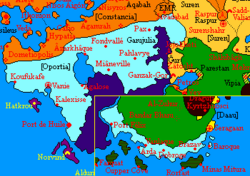Oportia: Difference between revisions
No edit summary |
No edit summary |
||
| Line 60: | Line 60: | ||
====Executive==== | ====Executive==== | ||
The Head of State is the [[Federal Representative of Oportia|Federal Representative]], who presides over the [[Federal Cabinet of Oportia|Federal Cabinet]]. | The Head of State is the [[Federal Representative of Oportia|Federal Representative]], who presides over the [[Federal Cabinet of Oportia|Federal Cabinet]]. There is no Vice-President, but a [[Federal Chancellor of Oportia|Federal Chancellor]]. | ||
====Legislature==== | ====Legislature==== | ||
Revision as of 22:09, 28 February 2024
| The State of Oportia L'État d'Oportie | |||
| |||
| Motto: Liberté avant tout | |||
| Anthem: Le bateau | |||

| |||
| Map versions | 17.5.7 – | ||
| Capital | Vanie | ||
| Official language(s) | Federal level: Alexandrian Istvanistani Regional level: Babkhi Pallisican Sarnechi Shahvekh Thraci | ||
| Official religion(s) | None | ||
| Demonym | Oportian | ||
| - Adjective | Oportian | ||
| Government | Constitutional federal republic under semi-direct democracy | ||
| - Federal Representative | Céline Beaumont | ||
| - Federal Chancellor | Felipe de Borbón y de los Santos | ||
| - Legislature | Federal Congress of Oportia | ||
| Establishment | 1706 AN | ||
| Area | TBD km2 | ||
| Population | 7,803,733 (1716 census) 13,872,322 (1726 est.) | ||
| Currency | Mérite | ||
| Calendar | Norton Calendar | ||
| Time zone(s) | CMT+2 | ||
| Mains electricity | 230 V, 50 Hz | ||
| Driving side | Right | ||
| Track gauge | Standard (1,435 mm) | ||
| National website | gou.op | ||
| National forum | |||
| National animal | |||
| National food | |||
| National drink | |||
| National tree | Beech | ||
| Abbreviation | OPO, OP | ||
The State of Oportia (Alexandrian: L'État d'Oportie) is a country located in the south of continent of Eura.
In 1707 AN, the country was ranked first in Micras Democracy Index, with maximum score in political participation and civil liberties. In 1719 AN, the country accessed the Xäiville Convention, a non-aligned political organisation of democratic states.
Etymology
History
The transformation into a federal republic followed a national referendum in 1722 AN, alongside the Oportian special general election, marking a significant shift in Oportia's political and economic landscape.
Geography
Government and politics
The government of Oportia is a constitutional republic with direct democracy.
Constitution
The new Constitution, established in 1722 AN, balances powers between the federal and city levels and introduces a progressive taxation system. Key aspects include political neutrality, environmentalism, and human rights protections.
Executive
The Head of State is the Federal Representative, who presides over the Federal Cabinet. There is no Vice-President, but a Federal Chancellor.
Legislature
The Federal Congress of Oportia is the legislative body, which proposes and votes on laws, policies, public initiatives, and referendums.
Judiciary
The Federal High Court is the highest court, overseeing violations of the constitution, federal law, and international laws.
Foreign relations
Law enforcement and military
The Oportian Security Forces remains a centralized body, with divisions for civilian, military, and special operations.
Economy
Following the 1722 referendum, Oportia adopted significant economic reforms, including a national progressive taxation system and employment programs in government infrastructure and community projects. The economy, while still heavily reliant on raw materials, is diversifying in manufacturing and services.
Demographics
As of 1726 AN, Oportia's estimated population stands at approximately 13.8 million.
Culture
Education
Media
Music
Cuisine
See also
- Vanie, the capital and largest city of Oportia;
- History of Oportia;
- Government and politics of Oportia;
- Oportian Security Forces;
- Constitution of Oportia;
- Laws of Oportia;
- Economy of Oportia.

